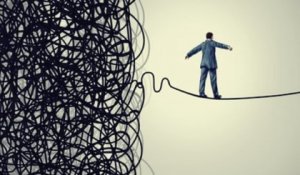Chaos and Narcissists: How Disorder Favors Narcissists

Chaos is a narcissist’s best friend. Without a general state of disorder, a narcissist can’t rule over others as easily. If there’s order, they have no power at all and also can’t spread the drama they love to start. That’s why chaos and narcissists go hand in hand.
We have to remember that experts characterize narcissism as excessive aggrandizement of the self. It’s not a sign of too much self-love, but an exaggeration of one’s own perception of oneself. It’s a false sense of greatness one has about oneself. Narcissism is a desire to stand out among others or, even further, to occupy a position above them.
“Chaos was the law of nature; Order was the dream of man.”
-Henry Adams-
A dose of narcissism is healthy in adults. It helps individuals keep themselves together and stabilize their presence in the world. Nevertheless, when this pseudo-love for the self is excessive, it can bring about pathological narcissism. In the most extreme cases, narcissists become incapable of valuing anyone but themselves. Other people are no more than instruments in their quest to feel superior.
Chaos and narcissists
Pathological narcissists engage in a set of behaviors that aim to satisfy their need to feel superior. What these behaviors all have in common is that they sow the seeds of chaos to some extent. Narcissists are better able to control others and “be someone” in states of disorder.

Bosses or leaders who are always barking orders and those who implement absurd measures that make things more complicated for others love chaos. This is the perfect environment for those who don’t communicate clearly and confuse people. If things still turn out ok despite these issues, they’ll claim all the credit. If their employees make mistakes, then their unclear commands give them some leeway to place the blame on others.
Narcissists also promote chaos in more familiar or ordinary situations. They’re those friends, family members, or romantic partners who tell you one thing and do the other without any apparent reason. They tell you they’ll help you, for example, but when you need them, they’re nowhere to be found. They promise that they’ll arrive at a certain time but don’t. These people play with your expectations and throw you off balance. They sow chaos and gain some control over other people through it.
Narcissists and drama
In the case of pathological narcissism, chaos tends to be accompanied by drama. The boss or leader we spoke of before brings their disorder forth with fake displays of indignation and worry. They’ll display remorse or hysterical surprise whenever something happens. They’ll pretend as if they weren’t the ones who were driving uncertainty.

As such, they won’t apologize when they fail to fulfill a responsibility. Instead, they’re going to make it into a dramatic display. In fact, they usually end up playing the victim. They’ll say they have way too much to do and can’t handle the pressure.
At the heart of it, they create situations that allow them to feel like they control the whole world. They try to position themselves in the middle of everything, but without taking responsibility for their own actions. They use the world as a stage to display a show of intense emotional expressions.
Their effect on others
In one way or another, narcissists use chaos to break others psychologically. They design situations, often unconsciously, to keep others on edge. They want to make the people around them a little crazy. If they manage to achieve their goals, they’ll also get what they really want: to control others, even if they have to resort to tricks or other malicious behavior.
Nevertheless, this type of psychological reality always has two sides. On the one side, there’s the narcissist who’s sowing chaos and manipulating other people. On the other side, the narcissists that are victims of their own condition.
Narcissists are more likely to feel disenchanted and bored by their lives and their reality. In other words, they run a higher risk of depression.

This is because all of their actions are inauthentic. They’re trapped inside themselves, so to speak. These people can’t establish deep or meaningful bonds with the people around them and they depend too much on others. If they do manage to manipulate them, they satisfy that image of themselves that they yearn for. If they don’t, they easily come to feel inferior, feel a lack of interest in life, and feel frustrated.
Chaos is a narcissist’s best friend. Without a general state of disorder, a narcissist can’t rule over others as easily. If there’s order, they have no power at all and also can’t spread the drama they love to start. That’s why chaos and narcissists go hand in hand.
We have to remember that experts characterize narcissism as excessive aggrandizement of the self. It’s not a sign of too much self-love, but an exaggeration of one’s own perception of oneself. It’s a false sense of greatness one has about oneself. Narcissism is a desire to stand out among others or, even further, to occupy a position above them.
“Chaos was the law of nature; Order was the dream of man.”
-Henry Adams-
A dose of narcissism is healthy in adults. It helps individuals keep themselves together and stabilize their presence in the world. Nevertheless, when this pseudo-love for the self is excessive, it can bring about pathological narcissism. In the most extreme cases, narcissists become incapable of valuing anyone but themselves. Other people are no more than instruments in their quest to feel superior.
Chaos and narcissists
Pathological narcissists engage in a set of behaviors that aim to satisfy their need to feel superior. What these behaviors all have in common is that they sow the seeds of chaos to some extent. Narcissists are better able to control others and “be someone” in states of disorder.

Bosses or leaders who are always barking orders and those who implement absurd measures that make things more complicated for others love chaos. This is the perfect environment for those who don’t communicate clearly and confuse people. If things still turn out ok despite these issues, they’ll claim all the credit. If their employees make mistakes, then their unclear commands give them some leeway to place the blame on others.
Narcissists also promote chaos in more familiar or ordinary situations. They’re those friends, family members, or romantic partners who tell you one thing and do the other without any apparent reason. They tell you they’ll help you, for example, but when you need them, they’re nowhere to be found. They promise that they’ll arrive at a certain time but don’t. These people play with your expectations and throw you off balance. They sow chaos and gain some control over other people through it.
Narcissists and drama
In the case of pathological narcissism, chaos tends to be accompanied by drama. The boss or leader we spoke of before brings their disorder forth with fake displays of indignation and worry. They’ll display remorse or hysterical surprise whenever something happens. They’ll pretend as if they weren’t the ones who were driving uncertainty.

As such, they won’t apologize when they fail to fulfill a responsibility. Instead, they’re going to make it into a dramatic display. In fact, they usually end up playing the victim. They’ll say they have way too much to do and can’t handle the pressure.
At the heart of it, they create situations that allow them to feel like they control the whole world. They try to position themselves in the middle of everything, but without taking responsibility for their own actions. They use the world as a stage to display a show of intense emotional expressions.
Their effect on others
In one way or another, narcissists use chaos to break others psychologically. They design situations, often unconsciously, to keep others on edge. They want to make the people around them a little crazy. If they manage to achieve their goals, they’ll also get what they really want: to control others, even if they have to resort to tricks or other malicious behavior.
Nevertheless, this type of psychological reality always has two sides. On the one side, there’s the narcissist who’s sowing chaos and manipulating other people. On the other side, the narcissists that are victims of their own condition.
Narcissists are more likely to feel disenchanted and bored by their lives and their reality. In other words, they run a higher risk of depression.

This is because all of their actions are inauthentic. They’re trapped inside themselves, so to speak. These people can’t establish deep or meaningful bonds with the people around them and they depend too much on others. If they do manage to manipulate them, they satisfy that image of themselves that they yearn for. If they don’t, they easily come to feel inferior, feel a lack of interest in life, and feel frustrated.
This text is provided for informational purposes only and does not replace consultation with a professional. If in doubt, consult your specialist.







